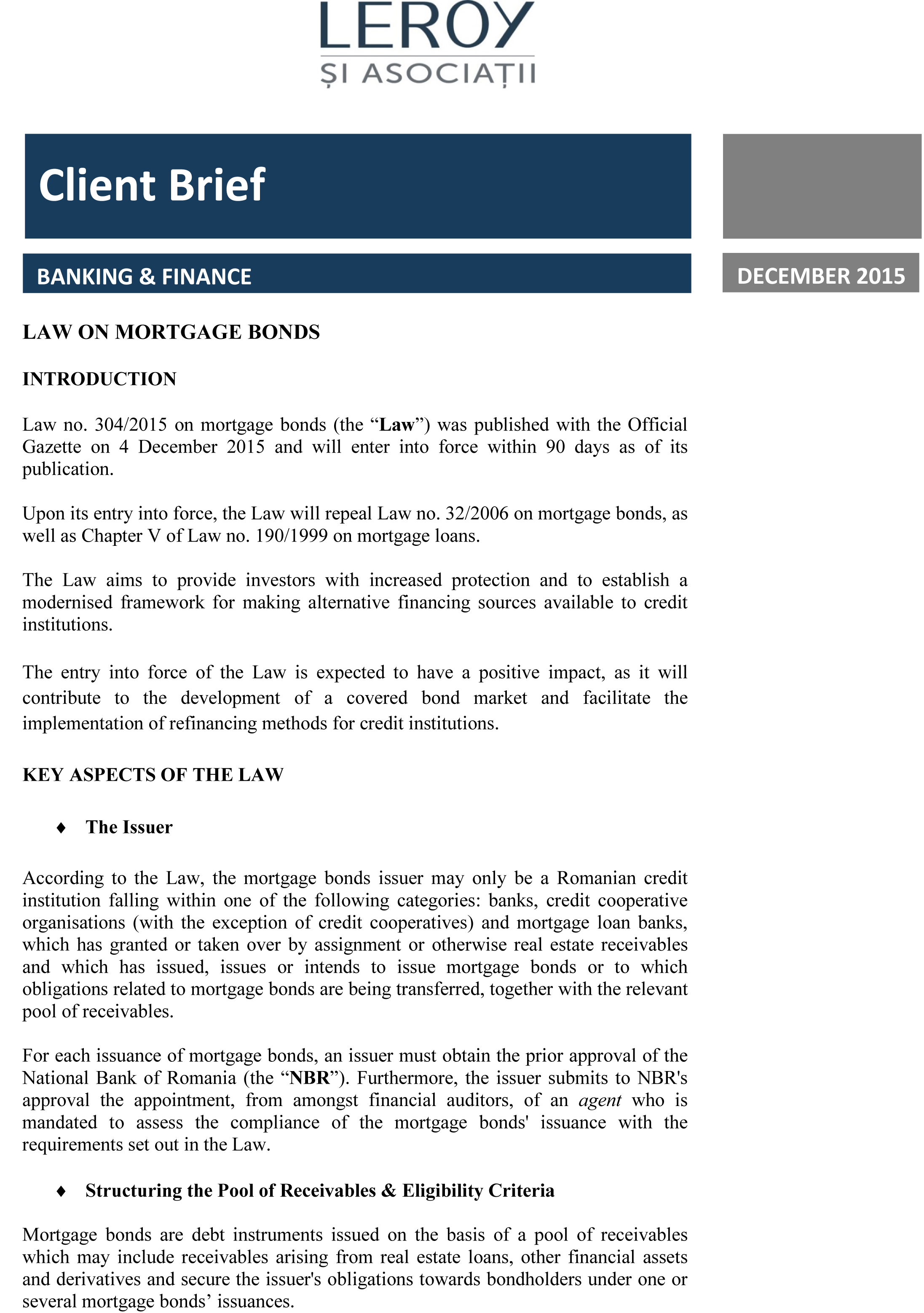Law no. 304/2015 on mortgage bonds (the “Law”) was published with the Official Gazette on 4 December 2015 and will enter into force within 90 days as of its publication.
Upon its entry into force, the Law will repeal Law no. 32/2006 on mortgage bonds, as well as Chapter V of Law no. 190/1999 on mortgage loans.
The Law aims to provide investors with increased protection and to establish a
The entry into force of the Law is expected to have a positive impact, as it will contribute to the development of a covered bond market and facilitate the implementation of refinancing methods for credit institutions.
Key aspects of the law
The Issuer
According to the Law, the mortgage bonds issuer may only be a Romanian credit institution falling within one of the following categories: banks, credit cooperative organisations (with the exception of credit cooperatives) and mortgage loan banks, which has granted or taken over by assignment or otherwise real estate receivables and which has issued, issues or intends to issue mortgage bonds or to which obligations related to mortgage bonds are being transferred, together with the relevant pool of receivables.
For each issuance of mortgage bonds, an issuer must obtain the prior approval of the National Bank of Romania (the “NBR”). Furthermore, the issuer submits to NBR’s approval the appointment, from amongst financial auditors, of an agent who is mandated to assess the compliance of the mortgage bonds’ issuance with the requirements set out in the Law.
Structuring the Pool of Receivables & Eligibility Criteria
Mortgage bonds are debt instruments issued on the basis of a pool of receivables which may include receivables arising from real estate loans, other financial assets and derivatives and secure the issuer’s obligations towards bondholders under one or several mortgage bonds’ issuances.
All elements of a pool of receivables securing the mortgage bonds are registered by the issuer with the Registry of Internal Evidence kept by the issuer.
In order to secure mortgage bonds, the issuers may acquire real estate loans receivables (either individual or within a pool) from one or several assignors. The enforceability of such assignment is ensured, in respect of third parties, by way of registration of the assignment with the Electronic Archive and, as regards real estate loans secured by immovable assets, with the Land Book of the immovable, and, in respect of the debtors, by way of notice delivered by the assignor within 10 days as of the date of the assignment. Furthermore, the creditors of the assignor must also be informed of the assignment and the identity of the assignee, either individually (in writing, with confirmation of receipt or electronically) or by publishing such information on the assignor’s official website.
The assignor may continue to service the assigned receivables, however all amounts collected by it shall be transferred daily to the account indicated by the issuer.
Furthermore, in order to ensure the required certainty as regards the pool of receivables, the Law sets forth the following derogations from the general legal principles: (i) a 45-day limitation period, in which the creditors of the assignor may file for the revocation of the assignment; (ii) an exception from the voidable preference in the assignor’s bankruptcy (the receivables are maintained in the issuer’s portfolio, even if the assignor’s creditors have obtained the cancellation of the assignment); (iii) a 45-day period for the debtors to notify the issuer whether they do not waive their set-off rights against the issuer (failure to do so, entails the stay of any set-off rights, as of the registration of the receivables with the Registry of Internal Evidence).
The Law provides a set of criteria for including the receivables within the pool securing mortgage bonds, amongst which: (i) the amounts granted under the real estate loans must have been fully released, (ii) the receivables must be free of any encumbrance, (iii) the rights in rem securing the loan must be created solely for the benefit of the issuer, and (iv) the LTV ratio may not exceed 80% for residential real estate loans, and 60% for other real estate loans1.
The Rights of the Mortgage Bondholders
A representative appointed by the General Meeting of the Mortgage Bondholders shall represent the rights of the bondholders.
Prior to the issuance of the mortgage bonds, the mortgage over the entire pool securing the mortgage bonds is registered by the agent with the Electronic Archive as a first ranking mortgage, in its name and on behalf of the mortgage bondholders. Further to the designation of the representative of the bondholders, such mortgage is transferred in the latter’s name.
Moreover, the security in respect of the mortgage rights related to a receivable included within the pool is not subject to Land Book registration.
The mortgage bondholders have priority against all other creditors of the issuer in respect of the forced execution of the pool of receivables securing their claims.
Bankruptcy Remoteness
The pool securing mortgage bonds represents an autonomous patrimony, which is solely affected for this specific purpose, being thus separated from the issuer’s patrimony. Hence, the pool of receivables is not affected by any proceeding regarding the liquidation of the issuer’s assets. Any sale-purchase agreements entered into in breach of the above principle are null and void.
A portfolio manager appointed in the bankruptcy of the issuer shall fully control all amounts collected in relation to the pool of receivables. The portfolio manager may submit to the approval of the General Meeting of the Mortgage Bondholders the acceleration of the mortgage bonds repayment and the assignment of the receivables included within the pool to a third party which is entitled to perform credit activities on a professional basis.
1 Loans partially secured by the State in accordance with certain governmental programmes, such as “Prima Casa” loans are exempted from meeting the conditions under (iii) and (iv) above.

